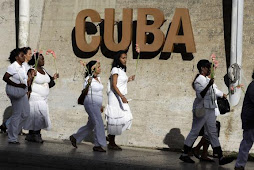Critical Analysis regarding Sunday's Cuban Elections
April 19, 2015
Erasmo Calzadilla
Elecciones 2015. Illustration by Cubadebate.cu
HAVANA TIMES – This Sunday another election will take place on the
island, and once again the people will decide who will be their
representative at the neighborhood level (Precinct delegates).
At least that's what the official discourse maintains. How far removed
is this from reality?
In an attempt to understand where the catch is, I encountered an
interesting work published by the magazine "Temas" [Topics]. Daniel
Rafuls Pineda, the author, describes a series of issues that in his
opinion impede citizen participation in the process of public
decision-making. For those who are unable to access the magazine, let me
summarize the ones I consider most critical:
- The Presidents and Vice Presidents of the People's Power municipal
assemblies (City Councils) are chosen in a plenary session by the
precinct delegates. Nevertheless, the candidates to these positions must
first be nominated by select candidate commissions; the selection
criteria are not made public, nor do the commissions reveal how many
have voted for each one.
- Even though theoretically the Cuban Communist Party can't propose its
own sympathizers, they exert a sizable indirect influence over the
electoral process via the nominations of candidates at every level. The
intervention of the PCC becomes more evident when the citizens
demonstrate little spontaneous disposition to elect or be elected; or
when the people select candidates without the due "revolutionary
integration"; and during the process of formation of the provincial and
national assemblies, which have an important role in decision-making.
- The Cuban electoral system claims to be based on the popular and
direct election of people chosen in the different neighborhoods,
communities and residential zones. Nonetheless, at the national
and provincial levels the assembly incorporates delegates who were not
directly chosen by the people; these compose over 50% of the members.
[In this way if a movement driven by popular inspiration should ever
occur, it could never reach a majority of the National Assembly because
the Party controls the gate to that, with over 50% of its members.]
- The delegates to the provincial and national People's Power Assemblies
that weren't chosen by the community weren't always promoted through a
broad process organized from the grass roots by the institutions that
they belong to. This occurs in the mass organizations, in the Communisty
Party and in the Party youth organization, the UJC.
- According to the Constitution, the National People's Power Assembly is
"the supreme organ of State power" that "represents and expresses the
sovereign will of all the people." Nonetheless, the Council of
State, which represents it between sessions, is the body that has had
the greatest legislative incidence at a national level. It has sometimes
even overturned laws approved by the National Assembly.
- The Constitution recognizes that the sessions of the National People's
Power Assembly should be public unless the Assembly itself agrees to
close them. Nonetheless, the meetings of their commissions are only
occasionally made public, a fact that affects the credibility of these
representatives in the eyes of those they represent.
This was a forceful essay and the magazine was very brave to publish it.
If I had previously already thought about not voting, well now I have
better arguments to back me up.
Notes:
- The article is titled "The Cuban electoral system: from formal
representation to real participation" It gained a mention as the Essay
Themes Award 2013 (Social Sciences); published in Temas 78, April-June 2014
http://www.temascuba.org/sites/default/files/articulos_academicos_en_pdf/Descargar%20art%C3%ADculo%20en_26.pdf
- The parenthesis in the third bullet point are mine
Source: Critical Analysis regarding Sunday's Cuban Elections - Havana
Times.org - http://www.havanatimes.org/?p=110727
Subscribe to:
Post Comments (Atom)





No comments:
Post a Comment